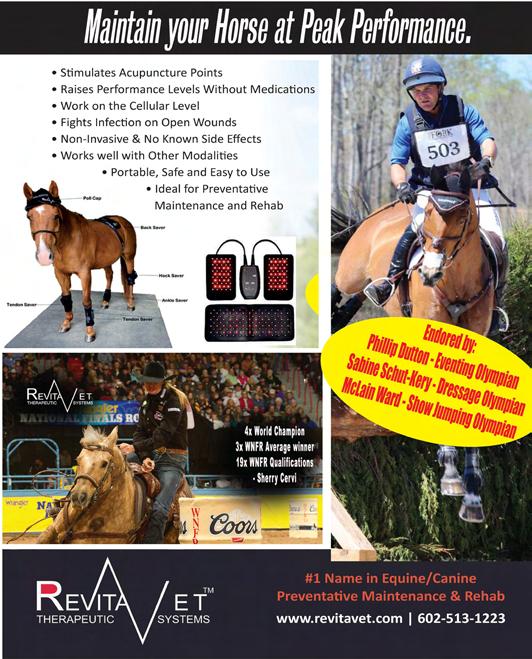
2 minute read
Is Your Horse Trying to Tell You Something?
Story and
Submi�ed By Colleen Sco�
Advertisement
“It’s certainly possible for a trained horse to have a bad day, but as a general rule, they aren’t emo�onal beings like humans, so they tend to try to do their jobs,” says Sarah Reuss, VMD, DACVIM, Equine Technical Manager, Boehringer Ingelheim. “When horse owners no�ce uncharacteris�c behavior, especially on an ongoing basis, it’s best to document those behaviors and consult with a veterinarian.”
What might surprise horse owners is that equine stomach ulcers can be a potential root cause of difficult training sessions, resistance to work and poor performance.1,2 These ulcers can develop in as few as five days,3 so it’s possible that Saturday’s well-behaved horse can become a different animal by Wednesday. Other potential clinical signs of equine stomach ulcers include poor appetitite, poor body condition, rough hair coat, weight loss and in some cases, low-level colic.4
Equine stomach ulcers can only be definitively diagnosed by conducting a gastroscopy.5 During this procedure, a veterinarian uses an endoscope – a tube with a small camera – and places it up the nose, through the esophagus and into the stomach in the standing, sedated horse. The procedure allows the veterinarian to explore the stomach and if there are any ulcers, describe where they are and how severe they appear. The veterinarian will be looking for any thickening, reddening, erosions or ulcerations of the stomach.

There are two types of stomach ulcers, Dr. Reuss explains. “Squamous ulcers are the most common, and are found in the upper part of the stomach where they form when stomach acid contacts the unprotected lining. The other type of ulcers are found in the glandular area which includes the pylorus or outflow of the stomach. These glandular ulcers are due to a combination of acid and loss of normal protective mechanisms.”
Should the veterinarian discover ulcers, he or she will recommend treatment with GastroGard® (omeprazole), the only proven and FDA-approved ulcer treatment product. Ideally there should be another gastroscopy performed at the end of treatment to ensure the stomach is back to normal.
There are ways to potentially avoid ulcers from recurring. Dr. Reuss recommends continuing to consult with the veterinarian who knows your specific horse, but in general providing continuous access to roughage through grazing or hay nets and feeding grain in multiple small meals daily is best.
In horses that are subject to stressors such as training, showing, trailering, including to trail riding, the loss of a pasture buddy or a move to another barn, Dr. Reuss recommends asking the veterinarian about using UlcerGard® (omeprazole) to help prevent ulcers from occurring, particularly during times of stress.
For more information, go to https://bi-animalhealth.com/equine/gastric-health.
About Boehringer Ingelheim Animal Health USA
Boehringer Ingelheim Animal Health is working on first-in-class innovation for the prediction, prevention, and treatment of diseases in animals. For veterinarians, pet owners, producers, and governments in more than 150 countries, we offer a large and innovative portfolio of products and services to improve the health and well-being of companion animals and livestock.
As a global leader in the animal health industry and as part of the family-owned Boehringer Ingelheim, we take a long-term perspective. The lives of animals and humans are interconnected in deep and complex ways. We know that when animals are healthy, humans are healthier too. By using the synergies between our Animal Health and Human Pharma businesses and by delivering value through innovation, we enhance the health and well-being of both.
Boehringer Ingelheim Animal Health has deep roots in the U.S. From a start in St. Joseph, Missouri, more than 100 years ago, it has grown to encompass seven sites. Boehringer Ingelheim Animal Health’s portfolio contains widely used and well-respected vaccines, parasite-control products and therapeutics for pets, horses and livestock including NexGard®, Heartgard®, Pyramid® + Presponse®, VAXXITEK®, CircoFLEX® and Prascend®.
Learn more about Boehringer Ingelheim Animal Health USA at https://bi-animalhealth.com/.
ULCERGARD® and GASTROGARD® are registered trademarks of Boehringer Ingelheim Animal Health USA Inc. © 2022 Boehringer Ingelheim Animal Health USA Inc., Duluth, GA. All rights reserved. US-EQU-0127-2022










